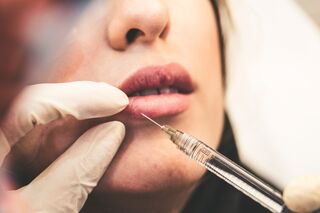Intelligence
What Impacts Women's Attitudes Toward Cosmetic Surgery?
New research reveals similarities and differences in attitudes across cultures.
Posted April 28, 2022 Reviewed by Michelle Quirk
Key points
- Chinese and Dutch women with higher facial appearance concerns experience more favourable attitudes toward cosmetic surgery.
- Materialistic beliefs, believing that possessions are important for a "good" life, also contribute to favourable attitudes.
- Chinese and Dutch women face similar, but some unique, social and cultural pressures that can encourage them to undergo surgery.

This guest post is written by Ph.D. student, Yi Wu.
Cosmetic surgery, both surgical procedures (e.g., liposuction, breast implants) and nonsurgical ones (e.g., Botox), is associated with physical and psychological risks. Yet, the global cosmetic surgery market has witnessed a drastic expansion in recent years. An increasing number of women seek cosmetic surgery for appearance "improvement" and, worryingly, their age is getting ever younger.
While China takes the first place with respect to the speed at which its cosmetic surgery market is expanding, the demand for cosmetic surgery in the Netherlands also keeps increasing. To better understand women’s views toward cosmetic surgery, particularly from a cross-cultural perspective, my colleagues and I conducted two new studies to investigate Chinese and Dutch women’s attitudes toward cosmetic surgery and what influences those attitudes.
Questionnaire Study
Our questionnaire study comprised 763 women; 245 were Chinese women in China, 265 were Chinese women in the Netherlands, and 253 were Dutch women in the Netherlands. They completed a series of questionnaires measuring their attitudes toward cosmetic surgery and other potential related factors.
Using these data, we then examined the statistical relationships between participants’ attitudes toward cosmetic surgery and their scores on the other questionnaires, as well as their age.
The key findings were that higher levels of facial appearance concerns and higher levels of materialistic beliefs were the strongest predictors of women’s favourable attitudes toward cosmetic surgery. Facial appearance concerns refer to how much a person has worries about the appearance of their face, whereas materialistic beliefs describe the extent to which a person thinks that materialistic possessions (e.g., expensive cars, luxurious clothing) are important to be happy and successful in life.
Furthermore, to our surprise, Chinese women, in both China and the Netherlands, who scored higher on body appreciation also scored higher on cosmetic surgery consideration. Body appreciation refers to accepting, respecting, and having a favourable opinion of one’s own body, regardless of how it looks. This finding is in marked contrast with the broader literature on positive body image, which has shown that body appreciation is related to less favourable attitudes toward cosmetic surgery, potentially because women who love and accept their body are less likely to harm their body via behaviours such as cosmetic surgery.
Last, age and beauty-ideal internalisation (i.e., the extent to which people “buy into” societal beauty ideals) predicted more favourable attitudes toward cosmetic surgery consideration among Chinese women in China, but not among Chinese women in the Netherlands, or among Dutch women in the Netherlands.
Interview Study

In our interview study, we conducted in-depth one-on-one interviews with 20 Chinese women and 20 Dutch women aged between 18 and 50 years, about their attitudes toward cosmetic surgery and what they perceived to affect these attitudes. Afterward, we analysed the interview transcripts to identify the main patterns, or “themes,” across Chinese and Dutch women’s experiences.
Overall, Dutch and Chinese women shared more similarities than differences in their attitudes toward cosmetic surgery. For example, all of the women described that having cosmetic surgery could help women to “take control” over their physical appearance and how other people view and treat them, and could help them to be recognised—for example, by potential dates. They also described that cosmetic surgery is now seen as “normal” and that they knew people in their social circle who had undergone procedures. Another example is that all of the women described that pressures from media and advertising would make them more likely to undergo cosmetic surgery. They felt driven to achieve the image of “beauty” that they saw in mass media, as well.
Just two of the themes differed between Chinese and Dutch women. Namely, all Chinese women but only two Dutch women described “socioeconomic benefits” that could motivate women to undergo cosmetic surgery. For example, Chinese women described that having a youthful and beautiful appearance could increase the chance of marrying a man with greater social status and financial ability, as well as the chance to achieve greater career success, particularly when the top individuals in the workplace tend to be men. Relatedly, a few Chinese women expressed their understanding of the phenomenon of adolescent girls undergoing cosmetic surgery and said they might also allow their daughters to undergo cosmetic surgery for a better future.
Another cross-cultural difference concerns body appreciation. Namely, Chinese women thought that body appreciation would encourage women to undergo cosmetic surgery, whereas Dutch women thought the opposite. This difference in opinion might be due to differences in how Chinese and Dutch women conceptualise the term “body appreciation.” That is, Chinese women described body appreciation as loving and paying attention to the self to an exaggerated degree; they considered women who experienced body appreciation as narcissists who would invest a lot in appearance improvement, including cosmetic surgery. In contrast, Dutch women described the experience of body appreciation as unconditional acceptance and respect of one’s body, regardless of how it looks.
The Take-Home Message
Overall, Chinese and Dutch women share many similarities in their opinions about what might affect cosmetic surgery consideration. This finding supports the fact that undergoing cosmetic surgery has become a global phenomenon, and the factors related to it may generalize across cultures. Across both Chinese and Dutch cultures, and more globally, women experience pressure to adhere to societal beauty standards, which are often difficult to achieve and maintain (e.g., youth, thinness). These pressures occur in their immediate social surroundings (e.g., comments from peers) but also from broader social influences (e.g., social media, cosmetic surgery advertisements).
Our questionnaire study found that Chinese and Dutch women who were more concerned about the appearance of their face held more favourable attitudes toward cosmetic surgery. This is consistent with figures showing that facial cosmetic procedures are becoming increasingly popular in the world and are the most popular in China. Potentially, the increase in the different types of facial procedures available, and the worldwide usage of "selfies" and social media, may promote attention to facial features, particularly those that are perceived as "flawed."
Our questionnaire study also found that Chinese and Dutch women with higher materialistic beliefs were more likely to consider undergoing cosmetic surgery. This may be in relation to global economic change and the emergence of consumerism, which stresses having materialistic possessions as the key to life satisfaction. Furthermore, physical attractiveness and materialistic success are often depicted together in mass media, which may further drive women to undergo cosmetic surgery for a more materialistically satisfactory life.
Among Chinese women only, older women have indicated a stronger desire to undergo cosmetic surgery, which may reflect that looking young is stressed by Chinese beauty ideals. Meanwhile, believing that more beautiful women can get more socioeconomic resources (e.g., marrying a wealthy man, having a successful career) can motivate Chinese women to undergo cosmetic surgery. This may correspond to the lower gender equity experienced by Chinese women, such that cosmetic surgery is seen as a viable and desirable strategy to improve their life situation.
To our surprise, Chinese women with higher levels of body appreciation tend to have more favourable attitudes toward cosmetic surgery. Chinese women’s conceptualisation of body appreciation contrasts with its original meaning (i.e., to accept, feel positive, and respect one’s body, regardless of how it looks), which was developed based on research among women in Western countries. Chinese women’s different conceptualisation may reflect characteristics of Chinese culture. For instance, Confucianism stresses self-reflection, self-improvement, and self-criticism, instead of unconditional acceptance, as keys to personal development. Within Chinese families, children are taught to honour, not to shame, their families by being superior in all life aspects from a younger age, potentially including their physical appearance.
To conclude, our findings underline the significant sociocultural appearance pressures on women, across cultures, which could promote and reinforce negative body image and cosmetic surgery consideration. However, optimistically, some factors that could motivate women to undergo cosmetic surgery may be amenable to change (e.g., fostering greater unconditional body acceptance, directing attention to develop other personal traits that are more adaptive and beneficial). After all, we are hopeful that the present findings will inspire future cross-cultural research in understanding women’s attitudes toward cosmetic surgery and advancing psychosocial interventions to help women to develop a healthy body image.
References
Wu, Y., Alleva, J. M., Broers, N. J., & Mulkens, S. (2022). Attitudes towards cosmetic surgery among women in China and the Netherlands. PLOS ONE, 17(4), e0267451.
Wu, Y., Mulkens, S., & Alleva, J. M. (2022). Body image and acceptance of cosmetic surgery in China and the Netherlands: A qualitative study on cultural differences and similarities. Body Image, 40, 30-49.




